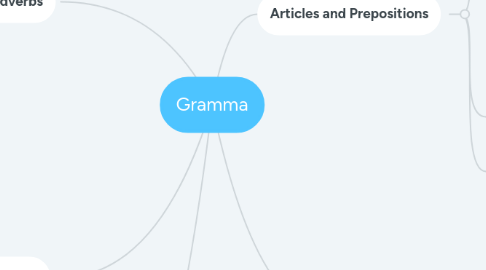
1. Adjectives and Adverbs
1.1. Why they are important? Adjectives and adverbs create pictures that help us visualize a writer's words.
1.2. Definition of adjectives: adjectives describe nouns and pronouns.
1.2.1. Examples: #1: A beautiful girl is looking at me. #2: I like eating red apples. #3: The yellow banana is my favorite.
1.3. Definition of adverbs: Use adverbs to describe any action verb.
1.3.1. Examples: #1: I usually write my homework at 6:00 PM. #2: I always play computer game everyday. #3: I sing the song loudly.
1.4. Special case: Adjectives with Non-action verbs
1.4.1. Examples: #1: The food taste bad. #2: The flower smells good. #3: I feel bad today.
2. Roots, Prefixes, and Suffixes
2.1. Why they are important? It is helpful to know the meaning of roots, prefixes, and suffixes in order to "attract" new vocabulary.
2.2. Definition of roots: English is based on Latin, but many English words have been borrowed from Greek, French, German, Italian, and Spanish Language.
2.2.1. Examples: #1: Undress-dress(means clothing) #2: Remove- move( means a change of place or position) #3: Consent-sent(means send)
2.3. Definition of Prefixes:a word, letter, or number placed before another.
2.3.1. Examples: #1: Anti(against, opposite): Antisocial people are not good. #2: Dis(not, apart from): Disadvantages are hard to change. #3: Un(not) Unlucky person is more likely to believe in religion.
2.4. Definition of Suffixes: a word, letter, or number placed after another.
2.4.1. Examples: #1: er(person) I want to be a teacher in the future. #2: ful: You need to be careful about the accident. #3: tion: I want to win the competition with him.
3. Active and Passive Voice
3.1. Definition of Active: the subject is doing the action.
3.1.1. Examples: #1: I achieved my dream last night. #2: I play computer games with my friends everyday. #3: He built the building in 2000.
3.2. Definition of Passive voice: It is formed by using the verb to be and a past participle. The object of the verb in an article sentence becomes the subject in a passive sentence.
3.2.1. Examples: #1: The dream was achieved by me last night. #2: The presentation was finished by our group. #3: The building was built by him in 2000.
4. Articles and Prepositions
4.1. Definition of articles: Put a/an/the before a noun.
4.1.1. The indefinite articles a and an are used with singular nouns only.
4.1.1.1. Examples:#1: There is an apple on the desk. #2: I usually eat a banana after breakfast. #3: I bought a computer last night.
4.1.2. The definite article the can be used with a singular or plural noun.
4.1.2.1. Examples: #1: The book I read this morning was Old Man and Sea. #2: The most popular celebrity I like is Justin Bieber. #3: I really like the color on the wall.
4.1.3. Special circumstances: Intangible or abstract nouns such as love, life, hope, beauty, and hate do not use any article when they are referred to in a general sense.
4.1.3.1. Examples: #1: Life is horrible. #2: I fall in love with Rachel. #3: I have no hope for this competition.
4.2. Why they are important? If you pay attention and practice using articles and prepositions, your writing will be more polished, and your spoken English will improve as well.
4.3. Definition of prepositions: The connection between objects and other words.
4.3.1. Examples: #1: During the vacation, I plan to visit Toronto. #: I would like to drink coke without ice. #3: Here is a book about Chinese history.
5. Verb Tenses and Irregular Forms
5.1. Definition of verb tense: In English, we use six tenses- three simple and three perfect. The simple tenses are past, present, and future. The perfect tenses are past perfect, present perfect, and future perfect.
5.1.1. Simple tense: The simple tenses are more specific about when an action or state of being occurs.
5.1.1.1. Examples#1: Past :I ate an apple yesterday morning. Present:I eat an apple each morning. Future: I will eat an apple next week.
5.1.2. Perfect tenses: The perfect tenses show the time an action or state of being begins and is completed(perfected).
5.1.2.1. Example#1: I have finished two assignments. #2: He has finished three assignments. #3: they have finished the group presentation.
5.2. Definition of irregular forms: A verb in which the past tense is not formed by adding the usual -ed ending.
5.2.1. Examples: #1: He read a book this morning. #2: He broke the window this morning. #3: He ate a breakfast this morning.

